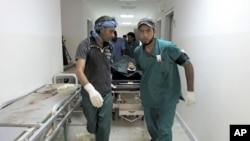Adel Ahmed, a strongly built, bearded man in a brown cap and t-shirt, commands a coterie of guards at a security checkpoint along the road between Misrata and Sirte.
Armed with Kalashnikov assault rifles, he and his subordinates check documents of passing motorists, much as established authorities might do in any war-torn region.
But Ahmed, like others at the roadblock, had a job until six months ago when he joined the rebels and freed the port city of Misrata after months of fighting in which about 2,000 people were killed. Previously a worker at the ports, he's one of the many former students and professionals who dropped their books or left their careers to support what they call the revolution against Moammar Gadhafi.
In the prolonged uprising that's ousted Libya's leader - driven largely by those enlisted of their own volition to battle government efforts to crush the revolt - volunteers such as Ahmed have also provided support in other ways.
"I volunteered, like all the others, first for freedom," he says, adding that when saw Gadhafi forces respond violently to peaceful protests, he felt he had no choice but to fight for a better country.
A health facility reorganized
In Tripoli's central burn hospital, medical student Ali al-Mughrabi tends to an injured boy. Not a doctor until next year, he says he is helping out as a nurse due to the shortage of professional caregivers. He's one of hundreds of volunteers from the neighborhood who have come to clean floors, cook food and wash dishes.
Previously an out-patient clinic for burn victims, the facility had been evacuated due to heavy shelling in the early weeks of fighting. Many of its former employees have only recently returned to find that it has been transformed into a major surgical and intensive care facility that tends to thousands of wounded.
On the streets
Out on the streets of Tripoli, young men clean the sidewalks and remove garbage for the first time since the government fell. Volunteer Saleh Dukalia explains why.
“Not all the people can go to [be with] the rebels," Dukalia says. "So they ... clean, paint, deliver water and deliver milk. We try to help.”
Some of the volunteers have begun to organize and register as civic associations, and Libya's new leadership welcomes the development.




